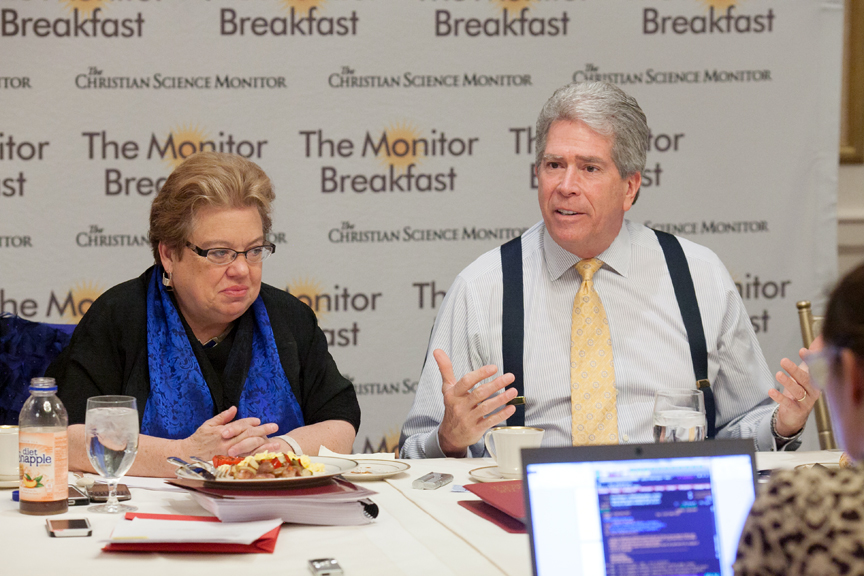
The 2014 midterms elections are shaping up to be a wave year of anti-incumbent hatred, according to a new poll—and given the circumstances on the ground, that’s good news for Republicans.
“The unique thing about this election is that both parties are universally despised. It’s a pox on both your houses,” Celinda Lake, the Democratic pollster involved in the George Washington University Battleground Poll released Tuesday, told reporters at a Christian Science Monitor breakfast in Washington. “The best thing Republicans have going for them is how much the public hates the Democrats. And the best thing the Democrats have going for them is how much the public hates the Republicans.”
But given the gerrymandered nature of many House districts, the coming wave is unlikely to flip control of the lower chamber, said Ed Goeas, the Republican pollster who worked on the survey. Democrats would need to flip 17 seats to win back the House, a tall order given that only one Republican-held seat leans Democratic, three are toss-ups and 16 lean Republican, according to the Cook Political Report, which monitors congressional races. But the Senate could very well change hands, Goeas said. Republican only need to win six of the 10 Democratic seats in play.
“For decades, voters have hated Congress, but liked their individual members,” Lake said. “Well, now those members are on notice because voters aren’t liking them so much any more.”
Less than half of voters—44% of Republicans and 49% of Democrats—approve of their current member of Congress, according to the poll.
Still, there are some bright spots for Democrats that distinguishes this cycle from 2010, which saw a huge anti-Democrat wave. Voters prefer Democrats on Social Security, 49% to 39%, and on Medicare, 51% to 37%. And Democrats have a seven-point advantage on the issue among seniors, which is important given that the group tends to comprise almost 60% of the electorate in off-year voting, and that Democrats have lost them the last two cycles.
At the same time, the new health care reform law has helped unite Republicans around more moderate candidates, helping to quash Tea Party insurrections in the primaries, the pollsters said. “The moderate Republicans are not getting knocked off by the Tea Party candidates this cycle,” Lake said. “They have red meat they can throw out: All they have to do is say they hate Obamacare and the Tea Party candidates find themselves agreeing.
“The challenge for Democrats is turn out,” Lake added. “Democrats usually trail behind Republicans by 10 to 15 points in enthusiasm in off presidential years. But this is now double, which is sobering.”
Democrats are betting on a message of income inequality, which the poll shows is popular with voters. In the survey, Democrats lead Republicans when it comes to voters’ confidence that they’ll stand up for the middle class, 54% to 36%, and on representing middle class values, 52% to 39%.
Goeas said those numbers don’t rule out Republicans also making a play on the issue. “The middle class believes it’s getting squeezed from both sides. They’re carrying the poor while the rich avoid paying,” he said. “The difference is, they aspire to be in the same category as the rich.”
Goeas said Republicans need to do a better job talking about solutions, not just values.m “When Democrats say, for example, that Republicans aren’t for a minimum wage hike, that’s not true,” Goeas said. “They are for it, but they are for the states doing it, not the federal government.”
The poll of 1,000 likely voters was conducted by Goeas’ Tarrance Group and Lake’s Lake Research Partners March 16-20. The margin of error was plus or minus 3.1%.
More Must-Reads from TIME
- Inside Elon Musk’s War on Washington
- Meet the 2025 Women of the Year
- The Harsh Truth About Disability Inclusion
- Why Do More Young Adults Have Cancer?
- Colman Domingo Leads With Radical Love
- How to Get Better at Doing Things Alone
- Cecily Strong on Goober the Clown
- Column: The Rise of America’s Broligarchy
Contact us at letters@time.com